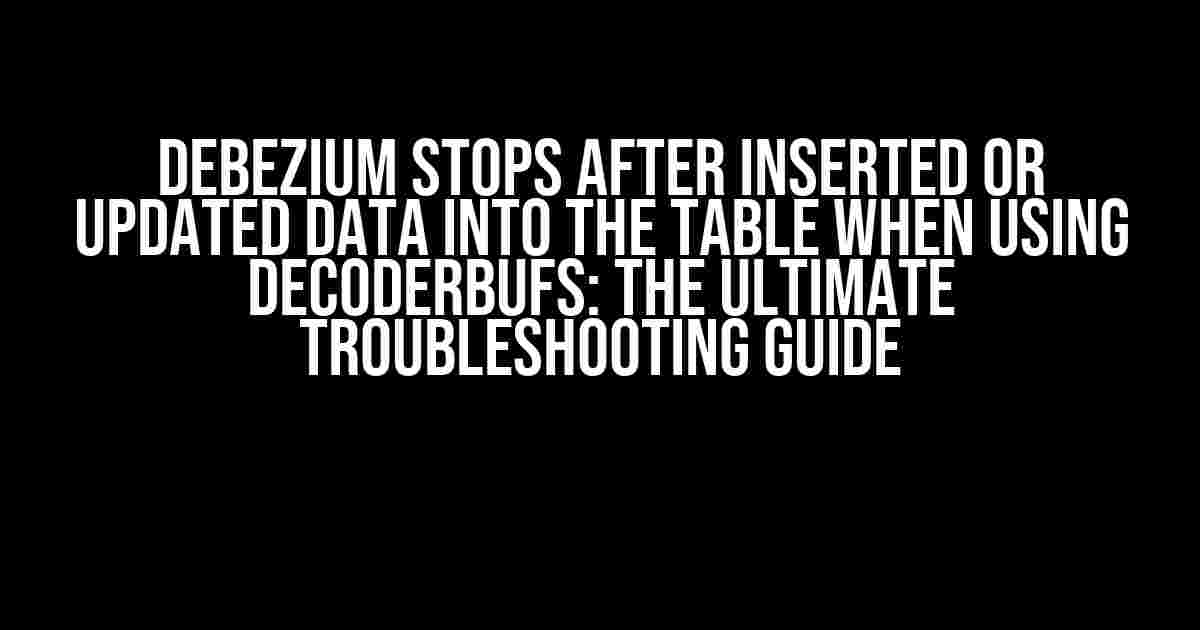Have you ever encountered the frustrating issue of Debezium stopping after inserting or updating data into a table when using decoderbufs? You’re not alone! This problem can be infuriating, especially when you’re in the middle of a critical project. But fear not, dear reader, for we’ve got you covered. In this comprehensive guide, we’ll walk you through the possible causes and provide step-by-step solutions to get you back on track.
What is Debezium?
Before we dive into the troubleshooting process, let’s quickly cover the basics. Debezium is an open-source, distributed platform that captures changes in your databases and produces events that can be used to trigger actions in downstream systems. It’s a powerful tool for real-time data integration and event-driven architectures. Decoderbufs, on the other hand, is a plugin used in Debezium to decode and serialize data.
Why does Debezium stop after inserting or updating data?
There are several reasons why Debezium might stop after inserting or updating data when using decoderbufs. Here are some of the most common causes:
- Invalid configuration: Misconfigured Debezium or decoderbufs settings can cause the platform to stop working.
- Data type mismatch: When the data type in the database doesn’t match the data type in the decoderbufs configuration, it can lead to conflicts.
- Schema changes: Changes to the database schema can cause Debezium to stop functioning if not properly updated.
- Performance issues: High CPU usage, memory issues, or network latency can cause Debezium to stop.
- Decoderbufs limitations: Decoderbufs has limitations on the amount of data it can process, which can cause Debezium to stop.
Troubleshooting Steps
Now that we’ve covered the possible causes, let’s get into the troubleshooting process. Follow these steps to identify and fix the issue:
- Check the configuration: Review your Debezium and decoderbufs configuration files to ensure that they are properly set up. Pay attention to the data type, schema, and performance settings.
- Verify data type consistency: Ensure that the data type in the database matches the data type in the decoderbufs configuration. You can use tools like SQL clients or database management systems to verify the data types.
- Update schema changes: If you’ve made changes to the database schema, update the Debezium configuration to reflect the changes. Use the Debezium schema history topic to track changes.
- Monitor performance metrics: Keep an eye on performance metrics like CPU usage, memory, and network latency. Use tools like Prometheus, Grafana, or Java Mission Control to monitor performance.
- Increase decoderbufs buffer size: If you’re experiencing issues due to decoderbufs limitations, try increasing the buffer size. You can do this by adding the following configuration:
{ "decoderbufs.buffer.size": 1024, "decoderbufs.buffer.max.size": 10240 } - Enable debug logging: Enable debug logging in Debezium to get more detailed error messages. You can do this by adding the following configuration:
{ "log.level": "DEBUG" } - Consult the Debezium community: If none of the above steps resolve the issue, reach out to the Debezium community for help. Provide detailed error messages and configuration files to get assistance.
Common Errors and Solutions
In this section, we’ll cover some common errors you might encounter and their solutions:
| Error Message | Solution |
|---|---|
| java.lang.IllegalArgumentException: Invalid data type | Verify data type consistency between the database and decoderbufs configuration. Update the configuration to match the data type. |
| org.apache.kafka.common.errors.SerializationException: Error deserializing key/value for partition | Check the decoderbufs configuration and ensure that it can handle the data size and type. Increase the buffer size if necessary. |
| java.lang.OutOfMemoryError: Java heap space | Monitor performance metrics and adjust the Debezium configuration to optimize memory usage. Increase the heap size if necessary. |
| org.apache.kafka.common.errors.TimeoutException: Timeout of 60000ms expired | Check the network latency and adjust the Debezium configuration to increase the timeout period if necessary. |
Best Practices for Debezium and Decoderbufs
To avoid issues with Debezium and decoderbufs, follow these best practices:
- Regularly review and update configurations: Regularly review your Debezium and decoderbufs configurations to ensure they are up-to-date and optimized for your use case.
- Monitor performance metrics: Continuously monitor performance metrics to identify potential issues before they become critical.
- Test and validate changes: Thoroughly test and validate changes to your configurations or database schema to ensure they don’t cause issues.
- Use schema history topic: Use the Debezium schema history topic to track changes to your database schema and update the configuration accordingly.
- Enable debug logging: Enable debug logging to get more detailed error messages and facilitate troubleshooting.
Conclusion
Debezium stopping after inserting or updating data into a table when using decoderbufs can be frustrating, but with the right tools and knowledge, it’s easier to troubleshoot and resolve the issue. By following the steps outlined in this guide, you’ll be able to identify and fix the problem, and get back to using Debezium and decoderbufs to capture changes in your databases and produce events that trigger actions in downstream systems. Remember to follow best practices to avoid issues and ensure smooth operation.
Happy troubleshooting!
Frequently Asked Question
Get the insights to troubleshoot Debezium issues with decoderbufs!
Why does Debezium stop working after inserting or updating data into the table when using decoderbufs?
This issue usually occurs when Debezium’s buffer size is not sufficient to handle the volume of data being inserted or updated. Try increasing the buffer size by setting the `buffer.memory` configuration property to a higher value. This should allow Debezium to handle the data influx more efficiently.
How do I determine the optimal buffer size for Debezium when using decoderbufs?
To determine the optimal buffer size, monitor Debezium’s memory usage and adjust the `buffer.memory` property accordingly. You can also set the `buffer.count` property to a higher value to increase the number of events that Debezium can handle before flushing the buffer. Experiment with different values to find the sweet spot that ensures stable Debezium performance.
What happens if I don’t set the buffer.memory property when using decoderbufs with Debezium?
If you don’t set the `buffer.memory` property, Debezium will use its default buffer size, which might not be sufficient to handle the data volume. This can lead to Debezium stopping or slowing down due to insufficient memory. It’s essential to set the `buffer.memory` property to ensure Debezium can handle the expected data load.
Can I use decoderbufs with other CDC connectors in Debezium?
Yes, you can use decoderbufs with other CDC connectors in Debezium, such as MySQL, PostgreSQL, and Oracle. However, the configuration may vary depending on the specific connector and use case. Make sure to consult the Debezium documentation for connector-specific guidelines and best practices.
Are there any alternative approaches to using decoderbufs with Debezium?
Yes, you can consider using other buffering mechanisms, such as Kafka’s built-in buffering or external caching solutions. These alternatives may offer more flexibility and performance benefits depending on your specific use case. However, decoderbufs is a popular choice for Debezium users due to its ease of use and seamless integration.


